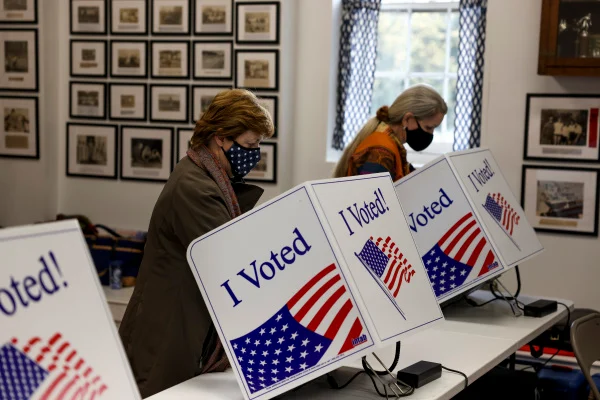According to a study recently published by The Heartland Institute, voter fraud was so widespread during the 2020 presidential election that “Donald Trump would almost certainly have won,” had even a fraction of the fraud been prevented.
“The results of this study clearly indicate that the massive scale of mail-in voter fraud in the 2020 election, as captured by the 2023 Heartland/Rasmussen survey, likely led to Joe Biden’s Electoral College victory. If even a small portion of this fraud had been prevented, Donald Trump would almost certainly have won the 2020 presidential election,” Jack McPherrin, a Research Editor at the institute claims.
“Even if the Heartland/Rasmussen survey substantially overestimated the degree of mail-in voter fraud (which we have no reason to believe it did), Trump would likely still have won, as we show in the myriad [of] fraud scenarios throughout the paper. This paper makes clear that mass mail-in balloting is not a secure method of voting, and that the results of any elections moving forward that involve mass mail-in voting will be similarly corrupted, as the 2020 results were,” McPherrin said.
The study surveyed 1,085 national “likely voters” between Nov. 30 and Dec. 6, 2023 and was conducted by the institute in conjunction with Rasmussen Reports.
READ MORE:
- I would absolutely not fly a MAX airplane’, Ex-Boeing Manager Warns
- Biden Admin to Loan $1.5 Billion to Restart Shuttered Michigan Nuclear Power Plant
- 28,000 Silicon Valley Employees Lose Their Jobs Just One Month Into 2024
Mail-in voters admit to fraud
The survey revealed that 21 percent of mail-in voters admitted that they voted in a state where they are “no longer a permanent resident,” and the same percentage admitted that they filled out a ballot for a friend or family member.
Success
You are now signed up for our newsletter
Success
Check your email to complete sign up
In addition, 17 percent of mail-in voters said “they signed a ballot for a friend or family member ‘with or without his or her permission,’” while 19 percent of mail-in voters said that “a friend or family member filled out their ballot, in part or in full, on their behalf.”
The study concluded that 28.2 percent of all respondents who voted by mail “admitted to committing at least one kind of voter fraud,” leading researchers to conclude that “more than one-in-four ballots cast by mail in 2020 were likely cast fraudulently, and thus should not have been counted.”
Since Biden received significantly more mail-in votes than Trump did, the study concludes that the outcomes in key swing states would have been different, particularly in states where the margins were razor thin, including in Arizona, Georgia, Michigan, Nevada, Pennsylvania and Wisconsin.
Had Trump carried these states he would have easily won the Electoral College.
The study explored 29 different scenarios with different levels of voter fraud ranging from as high as 27 percent to as low as three percent and found “that of the 29 different scenarios presented in the paper, Trump would have won the 2020 election in all but three.”
“In other words, had the 2020 election been conducted like every national election has been over the past two centuries, wherein the vast majority of voters cast ballots in-person rather than by mail, Donald Trump would have almost certainly been re-elected,” the study concluded.
“The evidence is now crystal-clear. Mail-in ballot fraud in the 2020 election was not only widespread, with more than one-in-four ballots cast involving a fraudulent activity, it was so substantial that it likely impacted the outcome of [the] presidential election,” Justin Haskins, Director of the Socialism Research Center at The Heartland Institute said, adding that, “As our study shows, had mail-in ballot fraud been mostly prevented or caught in 2020, Donald Trump, not Joe Biden, would be president of the United States today.”
READ MORE:
- Massive Snowstorms Engulf Central China Ahead of Lunar New Year, Stranding Travelers and Sparking Criticism
- Understanding the Chinese Calendar and Welcoming the Year of the Dragon
- ‘A Triumph of Traditional Chinese Culture’: Shen Yun Enchants Audiences in Japan
Proactive and preventative policies
Researchers at the institute put forward a number of proactive and preventative policies that they say would help to improve or maintain election integrity in future elections.
They recommend that states should update and verify election registration rolls annually, require identification to vote in person, encourage in-person voting, require a witness or notary signature on all mail-in ballots and should minimize mail-in voting by requiring a valid excuse to cast a ballot by mail.
Preventatively, researchers recommend that states should outlaw ballot harvesting, forbid unattended and unsecure election drop boxes, require signature verification for mail-in voting, establish agencies to investigate claims of election law violations and should pass laws that impose harsh penalties for those who commit voter fraud.
Jim Lakely, Vice President and Director of Communications for The Heartland Institute said, “It’s time the gaslighting by our ruling class and corrupt legacy media finally stop. It was obvious to anyone with eyes and common sense that the 2020 election was not ‘the most secure in American history.’ How could it be with historic national use of mail-in ballots, often handled with little security and lax standards for authentication?”
Lakely said that it is too late to “re-do the 2020 election” but that state legislatures “had better get moving to secure their voting, validation, and counting processes if Americans are ever going to trust our elections again.”
















